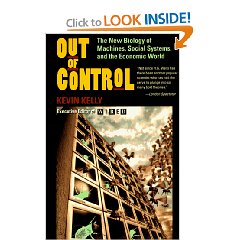
![]() Co-Evolution of Man and Machine,
Co-Evolution of Man and Machine,

![]() Co-Evolution of Man and Machine,
Co-Evolution of Man and Machine,
Excellent airplane book. Articulates concerns about business schools that disdain real business, for managers that count money instead of making it, and for governments that are complacent about the lack of an entrepreneurial culture within their business ranks. His general approach is to deconstruct companies into smaller units where the management can be close to the actual value-creation, there are simpler more honest relationships, and there is a combined sense of pride and urgency that increases the momentum and productivity of the group.

This book had a profound influence on me, helping me to understand that the functions fulfilled by an employee dealing with “things” are completely distinct from the functions fulfilled by an employee dealing with “ideas”, and that completely different educational, training, management, and compensation models are needed for the new “Gold Collar” worker. From this book I realized that virtually everything we are doing in U.S. education and U.S. personnel management and training today is way off the mark and at least a decade if not two or three decades behind where we could be in human productivity management.

Update of 31 May 08 to add links:
THE HACKER CRACKDOWN: LAW AND DISORDER ON THE ELECTRONIC FRONTIER
Hackers: Heroes of the Computer Revolution
Information Payoff: The Transformation of Work in the Electronic Age
Collective Intelligence: Mankind's Emerging World in Cyberspace (Helix Books)
The Unfinished Revolution: Human-Centered Computers and What They Can Do For Us
The Wealth of Networks: How Social Production Transforms Markets and Freedom
Collective Intelligence: Creating a Prosperous World at Peace

Comment: This is still one of the best books for someone who wants to think deeply about knowledge. Below are links to some others I recommend.
Our answer to Levy, but an order of magnitude more practical and steeped in some of the best endnotes I've ever enjoyed. Consilience is the “jumping together” of knowledge across boundaries, and the greatest enterprise of the mind. He begins with an example, showing how biology, ethics, social science, and environmental policy must all come together to properly resolve a global environmental issue, but actually do not-the learned individuals are fragmented into four separate communities, and within those communities further fragmented into nationalities and cliques and jobs, and it is our greater loss for we cannot arrive at the best policy without being able to integrate the knowledge across all these boundaries. He emphasizes that the public must be educated and have access to this unified knowledge, not just the policymakers. He poses, and then answers across the book, this question: “What is the relation between science and the humanities, and how is it important to human welfare?” In my own mind, Edward O. Wilson has defined both national and global intelligence writ large, and done so in way that suggests the “virtual intelligence community” is a very practical and achievable vision.
The Future of Life
The Wealth of Networks: How Social Production Transforms Markets and Freedom
The Wealth of Knowledge: Intellectual Capital and the Twenty-first Century Organization
Revolutionary Wealth: How it will be created and how it will change our lives
Powershift: Knowledge, Wealth, and Power at the Edge of the 21st Century
Infinite Wealth: A New World of Collaboration and Abundance in the Knowledge Era
The Age of Missing Information
Forbidden Knowledge: From Prometheus to Pornography
Smart Mobs: The Next Social Revolution
Information Productivity: Assessing Information Management Costs of U. S. Corporations